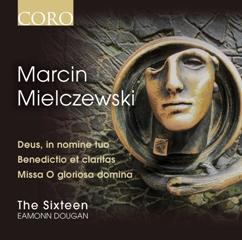Marcin Mielczewski - Choral Works (The Sixteen 2017)
Marcin Mielczewski - Choral Works (The Sixteen 2017)

01. Benedictio et claritas in A Minor 02. Missa Cerviensiana: Kyrie 03. Missa Cerviensiana: Gloria 04. Canzona terza a 3 05. Deus, in nomine tuo 06. Missa O gloriosa domina: Kyrie 07. Missa O gloriosa domina: Gloria 08. Gaude Dei genitrix 09. Missa O gloriosa domina: Credo 10. Iubilate Deo 11. Missa O gloriosa domina: Sanctus 12. Missa O gloriosa domina: Benetictus 13. Missa O gloriosa domina: Agnus Dei 14. Canzona prima a 2 15. Veni, Domine 16. Quem terra, pontus, aethera The Sixteen Eamonn Dougan - conductor
The fifth volume in this highly acclaimed series, conducted by The Sixteen’s Associate Conductor, Eamonn Dougan, celebrates the music of Polish composer Marcin Mielczewski. Together with Bartłomiej Pękiel, Mielczewski was amongst the most notable of 17th-century Polish composers and was recognised as a leader among his contemporaries. Influenced by the many Italian composers who graced the Polish courts in the 1600s, Mielczewski was a prolific composer. The cross-section of works recorded here shows an exceptionally accomplished musician at work, one whose music deserves a wider audience and who can confidently stand alongside the maestri who came before him and from whom he learnt his craft. ---challengerecords.com
You have probably never heard of Marcin Mielczewski. He is the latest in a series of 17th century Polish composers being brought to light by Eamonn Dougan and The Sixteen. Their latest disc on the Coro label features a programme of Marcin Mielczewski's choral music,including movements from his Missa Cerviensiana and Missa O gloriosa domina.
This is the fifth volume in the Sixteen's Polish series, and the unfolding programmes have allowed us to appreciate both native Polish composers and how they were influenced by the Italian composers working at the Polish court. King Sigismund III was, in particular, very fond of large-scale poly-choral music and Marcin Mielczewski almost certainly took part in musical performances under Asprillio Pacelli and Giovanni Francesco Anerio, as well as studying with Franciszek Lilius, a composer of Italian descent.
There seems to be a great deal we still do not know about Marcin Mielczewski, though he worked at the Royal court and would ultimately become chapel master to Bishop Charles Ferdinand Vasa. No Mielczewski seem to have survived either, so much is surmise and we can just listen to the music.
He write both in the modern concertato style as well as the older polyphonic style. His concertato works are clearly in the line established by Monteverdi, whilst his polyphonic works include such large-scale pieces as the three-choir Iubilate Deo. We also get some of his instrumental works on the disc.
The works on the disc all receive attractive and admirably engaging performances from Eamonn Dougan and the Sixteen, with their instrumental ensemble. Marcin Mielczewski is clearly a composer who deserves being released from the archives, and I hope that this disc encourages other choirs to investigate the composer. That said, I have to confess that though I find his music pleasing it never quite engaged me, certainly not a whole disc of it. One or two movements really grabbed my attention, but overall the sense was of a talented composer writing music of notable distinction, rather than an undiscovered genius. ---Robert Hugill, planethugill.com
W kompozycjach Marcina Mielczewskiego pobrzmiewają echa muzyki Giovanniego Pierluigiego da Palestriny i Claudia Monteverdiego, stile antico i stile moderno. Kierowany przez Eamonna Dougana ansambl The Sixteen po raz kolejny interpretuje muzykę dworu Wazów, umocowaną w prądach estetycznych i intelektualnych z Italii.
To piąty album, który brytyjski zespół The Sixteen, wyspecjalizowany w wykonawstwie historycznym, ale sięgający również po repertuar najnowszy, poświęca muzyce tworzonej na terenach dawnej Rzeczpospolitej. Po wydawnictwach poświęconych Bartłomiejowi Pękielowi, Grzegorzowi Gerwazemu Gorczyckiemu i włoskim koncertmistrzom (''The Blossoming Vine'', ''Helper and Protector'') przyszła pora na twórczość Marcina Mielczewskiego.
Nie wiemy zbyt dużo o jego życiu. Urodził się prawdopodobnie na początku XVII wieku – nie wiemy gdzie. Pod koniec trzeciej dekady XVII wieku znalazł się na dworze Zygmunta III w Warszawie. Źródła potwierdzają, że należał do królewskiego zespołu w 1632 rok, kiedy tron objął Władysław IV, ale nie wiemy, jaką sprawował tam funkcję. Był dwukrotnie żonaty, miał dwie córki i syna. Zmarł w 1651 roku. Eamonn Dougan, dyrygent The Sixteen, mówi:
Jak w przypadku wszystkich kompozytorów ujętych w tej serii, także tutaj zaznacza się wpływ Palestriny (konkretnie w motecie ''Gaude Dei genitrix''), podczas gdy mniejszych rozmiarów ''Veni, Domine'' oraz ''Deus, in nomine tuo'' świadczą o tym, jak biegle Mielczewski w umuzycznieniu tekstu czy idiomatycznej instrumentalizacji korzystał ze stile moderno. Trzykrotnie powtarzany refren w ''Benedicto et claritas'' to kapitalny przykład twórczych umiejętności Mielczewskiego w podkładaniu muzyki do słów [...]. Mistrzostwo instrumentacyjne artysty ukazują także dwie obecne na tym nagraniu canzony. Szczególną wirtuozerią charakteryzuje się Canzona a due wskazując, że Mielczewski sam mógł być nietuzinkowym skrzypkiem. ---culture.pl
download (mp3 @320 kbs):
Zmieniony (Wtorek, 20 Luty 2018 17:24)








